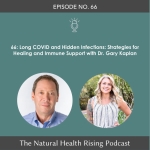How to Improve AFib Symptoms
Nutrition and other lifestyle modifications can have a meaningful influence on your Afib symptoms.
AFib, atrial fibrillation, is a form of arrhythmia (irregular heartbeat) that involves the upper chambers of the heart (atria). When the upper chambers are out of sync with the bottom chambers (ventricles) a person will experience an irregular heartbeat. AFib is the most common type of arrhythmia, affecting approximately 2.5 million adults in the United States, and unfortunately, that number is expected to rise.
Causes and Symptoms
Within the tissue of the heart, there is an electrical system that controls how the heart pumps. Most commonly, AFib is a result of damage to the heart tissue which may be caused by a condition like high blood pressure, obesity, type 2 diabetes, or an existing heart condition. It may also be caused by infection, aging, or genetics.
Between 10-40% of people with AFib are asymptomatic (“silent AFib”), but those who are symptomatic may experience any of the following:
- Fluttering heart or palpitations
- Shortness of breath
- Fatigue
- Chest pain
- Low blood pressure
- Dizziness
Untreated AFib can lead to an increased risk of blood clots, stroke, and heart failure or may even complicate other health conditions; therefore, it’s extremely important to have a discussion with your provider if you are experiencing symptoms or believe you may have AFib.
Suggested Lifestyle Modifications to Lower Risk of AFib
If you have been diagnosed with Atrial Fibrillation, management may involve medicine or, when necessary, a medical procedure called ablation; however, living a healthy life with AFib will always require lifestyle changes.
1 – Nutrition Modifications
Research confirms that a healthy diet can reduce AFib symptoms:
- A study published in Nutrients in 2022 showed that people who ate a Mediterranean diet had lower rates of AFib. Heavy on nuts, fruits, vegetables, fish, and extra virgin olive oil, the
Mediterranean diet is rich in phytochemicals, antioxidants, and healthy fats, all of which help lower overall inflammation and keep the immune system strong. - Excessive sodium can increase blood pressure, a known trigger for AFib. If you’re accustomed to eating processed, frozen, or take-out foods – all of which are very high in sodium – you’re likely to consume far more than the daily recommended amount of 2300 mg. Modifying your diet by cutting out high-sodium foods will have a profound effect on your overall health.
- Despite what we’ve learned about the cardio-protective effects of alcohol, patients with AFib will benefit by limiting or omitting alcohol consumption altogether. A 2021 study found that for people who have been diagnosed with AFib, even one drink can increase the odds of an episode by twofold; the more alcohol consumed, the greater the risk increased.
2 – Obesity and Weight Loss
Obesity is a known risk factor for AFib; the good news is that it can be improved by weight loss. A study in the J American College of Cardiology found that sustained weight loss can improve AFib symptoms six-fold in patients who lost more than 10% of their body weight.
If you are having difficulty losing weight, consider working with a nutritionist or healthcare provider who can implement a personalized nutrition program to help you safely and effectively reach your goals.
3 – Treating Sleep Apnea
There is a strong association between obstructive and central sleep apnea and Atrial Fibrillation. Sleep apnea can add an inordinate amount of stress on the body, including the cardiovascular system. A 2021 study found that people with sleep apnea are 2-4 times more likely to develop AFib. If you have sleep apnea talk to your provider about treatments to help you manage symptoms, which may include lifestyle changes, acupuncture, a customized mouthpiece, or CPAP machine. This is especially important if you have been diagnosed with AFib. This study also showed that patients who underwent ablation to improve AFib symptoms had greater success (i.e. less symptom recurrence) if their sleep apnea was previously treated.
4 – Quit Smoking (e-cigarettes too!)
Much like alcohol, nicotine is a stimulant that can increase heart rate and blood pressure. A 2018 review of research found that cigarette smokers have a 32% increased risk of developing AFib compared to non-smokers, but that quitting can lower that risk. Studies that look at e-cigarettes are not as plentiful yet, but preliminary research confirms an association; this 2022 study found that e-cigarette aerosols can increase arrhythmia in mice. A long-standing smoking habit can be hard to break, but it’s never too late to quit and the benefits make it well worth the effort.
Bottom line
Your heart is too important to ignore. Living a long, active, and healthy life with AFib is possible with the risk-factor modifications mentioned above. If you feel overwhelmed by the changes you need to make, consider working with a healthcare professional who can help you set goals that are realistic and achievable; your heart will thank you.
We are here for you, and we want to help.
Our goal is to return you to optimal health as soon as possible. To schedule an appointment please call: 703-532-4892 x2











Leave a Reply
Want to join the discussion?Feel free to contribute!